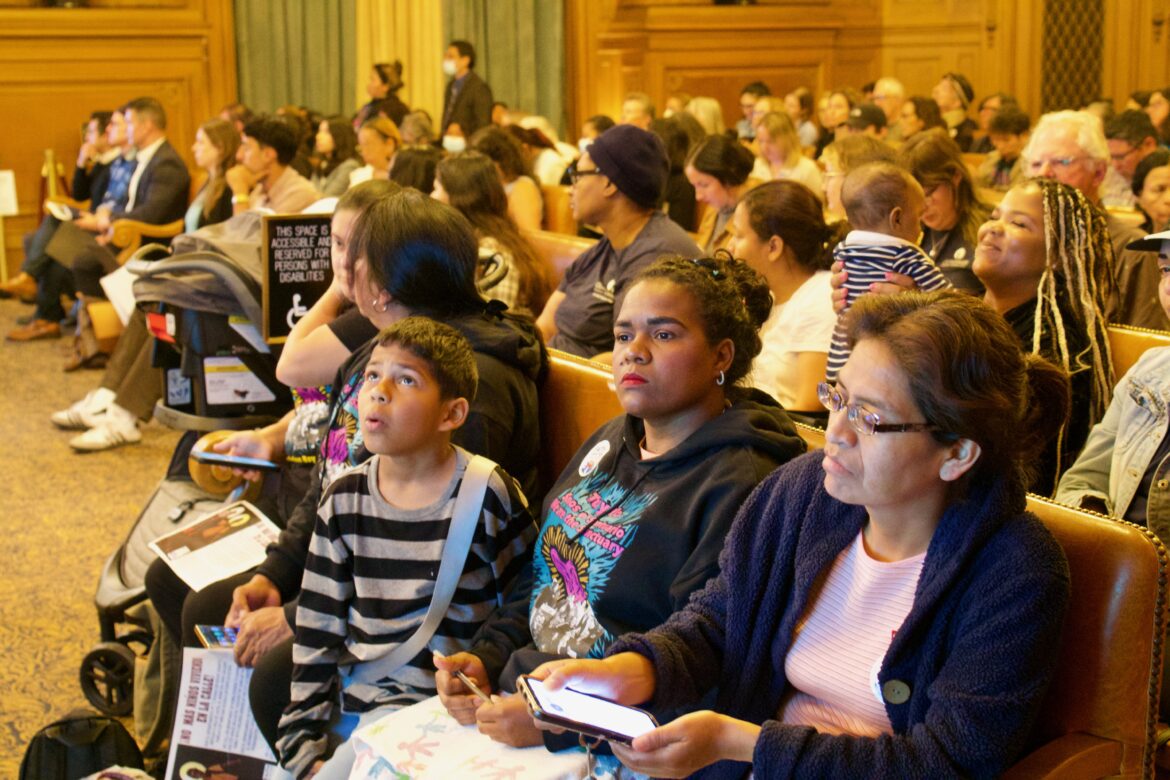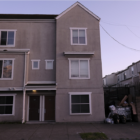Amid a major influx of unhoused migrant families into San Francisco, City Hall is expanding assistance to offer between 100 and 150 households temporary hotel stays in the next year, the Department of Homelessness and Supportive Housing said Monday.
A separate, possible $20 million outlay could help unhoused families cover rent for a limited time, the department’s spokesperson also said at the Board of Supervisors Rules Committee hearing. The funds must be approved in budget negotiations this summer.
But these new measures would fall short of serving all the families in need, the spokesperson acknowledged.
“There’s these huge communities of people fleeing violence, persecution, gangs, all these things, trying to survive and we’re basically telling them, ‘Sleep on the streets,’” said Supervisor Hillary Ronen, who chairs the committee and represents District 9, which contains the Mission District.
Migrant families have joined service providers and faith-based advocates in a push for a policy response to the mounting crisis, including increasing access to temporary housing and providing greater transparency about where families are on the waitlist for shelter. Supervisor Ahsha Safaí, who represents the Excelsior, Oceanview and other neighborhoods of District 11, recently took up the issue and wrote a non-binding resolution that called on the city to ensure migrant families would receive immediate shelter, among other services. He then convened Monday’s hearing, in which District 10 supervisor and committee member Shamann Walton was also present, to discuss potential policy solutions with staff from various city departments.
Following the homelessness department’s proposal, Ronen questioned whether the migrant families would be eligible for the rent subsidies that the $20 million infusion would fund. She referenced existing programs that prioritize recipients who have been homeless in San Francisco for many years.
Those programs are “not for the newcomer people that are coming, because they’re going to be really low on the list,” Ronen said.
Families from several countries shared their struggles accessing safe housing and pressed the city to do better.
“I don’t want my kids to end up on streets to relive trauma,” said Luz Mejía, an unhoused migrant from Peru. Her family had gotten a slot in the city’s temporary shelter system, but it had space for only three people so her husband stayed there with their kids while she remained on the streets.
“We need to respect our kids’ integrity, we need more transparency, more humanitarian effort, and more movement to find permanent housing for families,” said Margarita Solito, a mother of four from El Salvador who works with Faith in Action Bay Area. The organization has helped migrant families pay for short hotel stays, outside of government programs, and raise the alarm about the dire situation.
Supervisors Ronen and Safaí questioned why no one had declared a state of emergency.
Safaí, who is running to unseat Mayor London Breed this November, said Breed had the power to make that declaration, as she had in 2020 to give the government greater flexibility to confront the coronavirus pandemic. Department staff can recommend that she make a declaration.
Immigrant families newly arrived here might struggle to find housing or jobs, experts say.
“The increased number of migrants arriving don’t have the support networks or systems that previous waves might have had,” said Jorge Rivas, executive director of the Office of Civic Engagement and Immigrant Affairs.
The city lacks robust quantitative data on migrant family homelessness, Rivas said. That’s largely because many departments do not ask about immigration status when assessing people for services, in accordance with San Francisco’s “sanctuary city” policies.
But “all the qualitative data affirms that we are experiencing a steady stream of newcomer asylum seekers,” Rivas said.
For example, the number of public school students who are recent immigrants has risen steadily over the past three years, he said, and during this school year it reached its highest level in the last decade, at 1,566 children. Some of those students reported being unhoused, Rivas said. And a waitlist for legal representation by the San Francisco Immigrant Legal Defense Collaborative has ballooned to more than 900 people; typically it hovers at around 100 to 200 people, he said.
The supervisors said community members were raising these issues with them.
“We’re hearing anecdotally that hundreds of people are coming into the Bay Area every day,” Ronen said. She added that one family shelter reported “turning away people every single night. We’re hearing from our outreach workers that they find children sleeping on the streets every day.”
The Department of Homelessness and Supportive Housing will issue 35 new hotel vouchers, each giving the recipient household a two-week stay in a hotel. At the end of the period, the department could extend the stay or the voucher could go to another household, said spokesperson Emily Cohen.
The requested $20 million would pay for up to 100 five-year rent subsidies for families. That could still leave many families on the streets, based on figures Cohen presented at the hearing. As of last week, at least 375 families were waiting for rooms in homeless shelters to become available, she said.
Safaí said he would probably hold a follow-up hearing within the next two months to check on whether the homelessness department had issued the new vouchers and waitlist management had improved.
Fixing migrant family homelessness will require long-term solutions, said Hope Kamer, director of public policy and external affairs at Compass Family Services, which serves the unhoused population.
“I really, really hope that money will hit the streets and the safety net will be supported,” she said.










